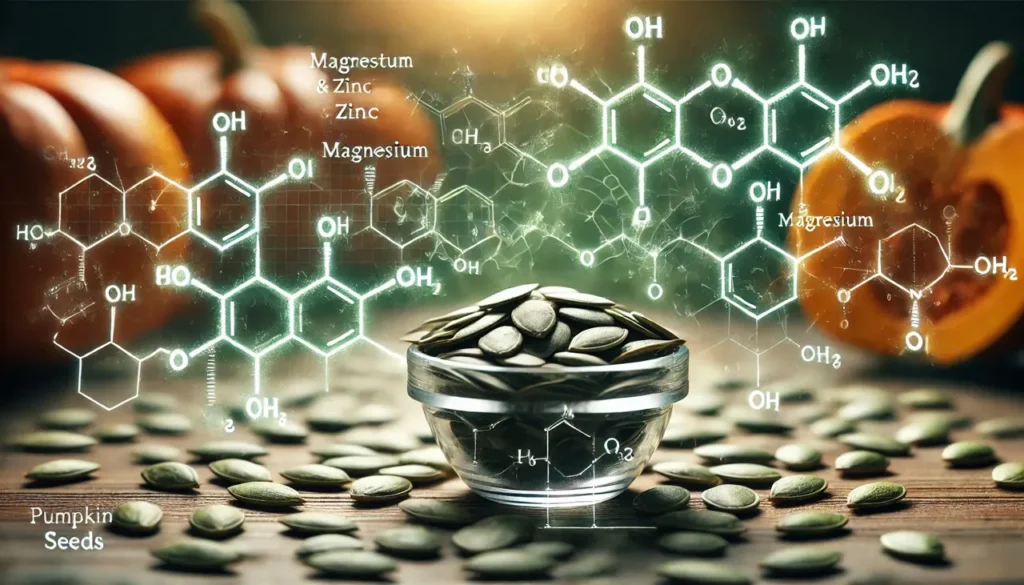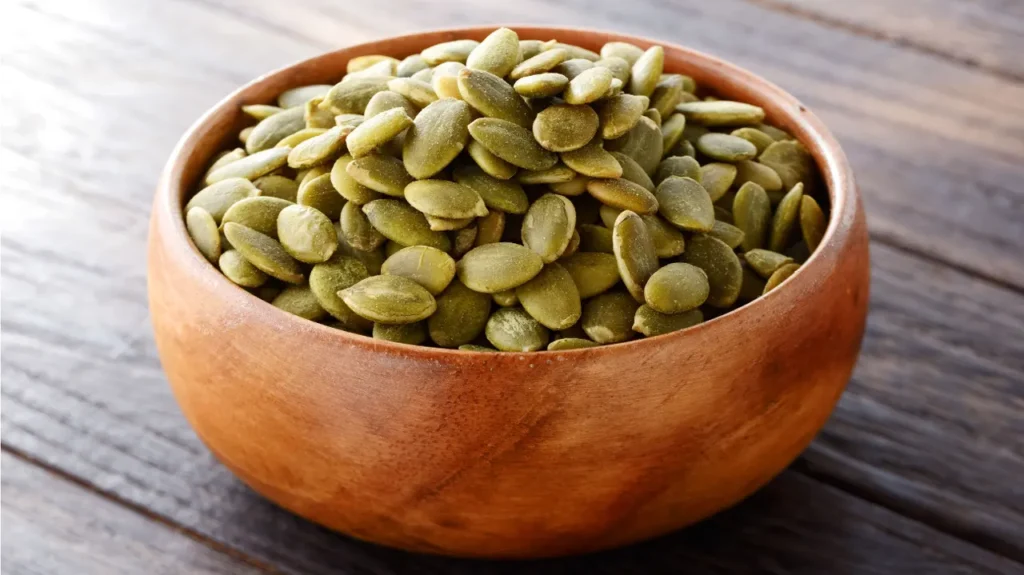Pumpkin (Cucurbita pepo), commonly recognized as a seasonal favorite, particularly in autumn, is far more than a decorative gourd. This nutrient-rich food has gained attention for its potential health benefits, including cognitive enhancement. Pumpkin is not only a source of vitamins and minerals but also contains unique bioactive compounds that may influence brain health and function. This article provides a comprehensive analysis of pumpkin, detailing its chemistry, physiological mechanisms, potential nootropic benefits, dosing guidelines, side effects, drug interactions, and other essential considerations for safe supplementation.
You May Also Like:
Beta Sitosterol: Benefits, Dosage, Side Effects, Drug Interactions, And Other Important Information
Salep: Benefits, Dosage, Side Effects, Drug Interactions, and Other Important Information
Sources of Pumpkin
Pumpkin is primarily grown in North America, but it is cultivated worldwide. The flesh, seeds, and oil extracted from pumpkin provide distinct nutritional benefits. The main sources include:
- Pumpkin Flesh: The edible part of the pumpkin, commonly used in pies, soups, and various dishes, is rich in vitamins A, C, and E, as well as dietary fiber.
- Pumpkin Seeds: Often referred to as pepitas, these seeds are nutrient-dense and are a significant source of magnesium, zinc, and healthy fats.
- Pumpkin Seed Oil: Extracted from the seeds, pumpkin seed oil contains high levels of fatty acids and antioxidants.
While fresh pumpkin is a fantastic source of nutrients, supplements in the form of pumpkin seed oil or pumpkin extract are also available for those looking to harness its health benefits more conveniently.
Get the Benefits of Pumpkin Seeds Oil for Sleep, Mood, and Brain Wellness—Order Now on Amazon!

Chemistry of Pumpkin
Pumpkin is rich in several key nutrients and bioactive compounds. Its chemistry is primarily characterized by:
- Vitamins: Pumpkin is a rich source of vitamins, particularly vitamin A (in the form of beta-carotene), which is crucial for vision and immune function. It also contains vitamins C and E, both of which have antioxidant properties.
- Minerals: Pumpkin seeds are high in magnesium, zinc, and iron, which are vital for various physiological functions, including neurotransmitter synthesis and cellular energy production.
- Phytochemicals: Pumpkin is abundant in carotenoids, particularly beta-carotene, lutein, and zeaxanthin, which have been linked to cognitive health and neuroprotection.
- Amino Acids: Pumpkin seeds are rich in tryptophan, an essential amino acid that serves as a precursor for serotonin, which is a neurotransmitter involved in mood regulation.
These compounds work synergistically to support not only physical health but also cognitive function, making pumpkin a potential candidate for nootropic supplementation.

Physiological Mechanisms of Pumpkin in the Body and Brain
The active compounds in pumpkin interact with the body through various mechanisms that may influence brain function.
- Antioxidant Activity: The high concentration of carotenoids and vitamins in pumpkin contributes to its strong antioxidant properties. These antioxidants help neutralize free radicals, reducing oxidative stress in brain cells. Chronic oxidative stress has been implicated in neurodegenerative diseases such as Alzheimer’s and Parkinson’s, highlighting the potential neuroprotective effects of pumpkin.
- Anti-Inflammatory Properties: Pumpkin’s bioactive compounds may also exert anti-inflammatory effects. Inflammation is a significant factor in cognitive decline; thus, compounds in pumpkin may help mitigate neuroinflammation, preserving cognitive function over time.
- Neurotransmitter Synthesis: The amino acids found in pumpkin seeds, particularly tryptophan, play a critical role in the synthesis of serotonin. Adequate serotonin levels are essential for mood regulation and cognitive function, suggesting that pumpkin consumption could positively affect mood and mental clarity.
- Cognitive Function Support: The presence of various vitamins and minerals in pumpkin, especially magnesium and zinc, supports cognitive processes, including memory and learning. These nutrients are crucial for synaptic plasticity, which is vital for forming new memories and learning new information.

Nootropic Benefits of Pumpkin
Given its rich nutritional profile and the physiological mechanisms involved, pumpkin may offer several nootropic benefits:
- Enhanced Cognitive Function: The antioxidants in pumpkin may protect brain cells from oxidative damage, potentially enhancing cognitive function. This is particularly relevant for individuals at risk of cognitive decline due to age or other factors.
- Mood Improvement: By supporting serotonin production, pumpkin may help improve mood and alleviate symptoms of depression and anxiety. This effect could lead to better focus and cognitive performance.
- Neuroprotection: The anti-inflammatory properties of pumpkin may reduce the risk of neurodegenerative diseases, offering a protective effect against cognitive decline associated with aging.
- Energy Metabolism Support: The nutrients in pumpkin, particularly its healthy fats and proteins, may help stabilize energy levels. This stabilization is essential for maintaining cognitive function, particularly during periods of mental exertion.
- Sleep Quality: The presence of tryptophan in pumpkin seeds may aid in improving sleep quality. Better sleep contributes to improved cognitive performance, as sleep is essential for memory consolidation and overall brain health.

Dosage and Supplementation Guidelines
For individuals looking to leverage the potential nootropic benefits of pumpkin, proper dosage and supplementation are crucial.
- Pumpkin Flesh: There are no established guidelines for the daily intake of pumpkin flesh. However, incorporating a serving (about one cup of cooked pumpkin) into your diet several times a week may provide beneficial nutrients.
- Pumpkin Seeds: A common dosage recommendation for pumpkin seeds is about 1 ounce (28 grams) per day. This amount provides a healthy dose of nutrients without excessive caloric intake.
- Pumpkin Seed Oil: For supplementation purposes, the typical dosage of pumpkin seed oil ranges from 1 to 2 teaspoons (5 to 10 ml) daily, depending on individual health needs and goals.
- Pumpkin Extracts: Standardized pumpkin extracts can vary in potency, so it’s essential to follow the manufacturer’s guidelines. A common range for pumpkin extract supplementation is 200 to 400 mg per day.
It is crucial to note that individuals should consult healthcare professionals before starting any new supplementation regimen, particularly if they have underlying health conditions or are taking medications.

Side Effects and Safety
Pumpkin is generally considered safe for most people when consumed as part of a balanced diet. However, some potential side effects may include:
- Allergic Reactions: Some individuals may be allergic to pumpkin or pumpkin seeds, leading to symptoms such as itching, hives, or digestive disturbances. If any allergic reactions occur, discontinue use and consult a healthcare provider.
- Gastrointestinal Issues: Overconsumption of pumpkin seeds or pumpkin products may lead to digestive discomfort, including gas, bloating, or diarrhea.
- Caloric Intake: While pumpkin is nutrient-dense, it is also calorically rich. Overindulgence in pumpkin-based products (like pumpkin pie) may lead to excessive calorie consumption, potentially contributing to weight gain.
- Medication Interactions: Pumpkin can interact with certain medications, particularly those that affect blood sugar levels. Individuals taking diabetes medications should monitor their blood glucose closely when consuming pumpkin in significant amounts.
Interactions with Other Supplements and Medications
Pumpkin and its derivatives can interact with several medications and supplements, potentially altering their efficacy or causing adverse effects. Notable interactions include:
- Blood Sugar Medications: Due to pumpkin’s potential to lower blood sugar, it may enhance the effects of medications used for diabetes management, leading to hypoglycemia. Individuals should work closely with their healthcare providers to adjust dosages if necessary.
- Anticoagulants: The high vitamin K content in pumpkin may interfere with blood-thinning medications, such as warfarin. It is essential for individuals on anticoagulants to maintain a consistent intake of vitamin K-rich foods.
- Antidepressants: The effects of pumpkin on serotonin synthesis may interact with certain antidepressant medications, particularly those that affect serotonin levels, such as SSRIs (selective serotonin reuptake inhibitors). Consulting a healthcare provider before combining these substances is advisable.
- Supplements: Pumpkin supplements, particularly those high in omega-3 and omega-6 fatty acids, may interact with other supplements that affect lipid metabolism. It is vital to monitor overall intake to avoid excessive consumption of specific fatty acids.
Risks for Individuals with Certain Health Conditions
While pumpkin is safe for most individuals, certain health conditions may necessitate caution:
- Diabetes: Individuals with diabetes should monitor their blood glucose levels when consuming pumpkin, as it may lower blood sugar levels. Adjustments in medication or dietary habits may be required.
- Allergies: Those with allergies to squash or other related plants should avoid pumpkin, as allergic reactions may occur.
- Gastrointestinal Disorders: Individuals with conditions such as irritable bowel syndrome (IBS) may experience exacerbation of symptoms with high fiber intake from pumpkin seeds or flesh.
- Kidney Disease: Pumpkin seeds are high in potassium; therefore, individuals with kidney disease should monitor their potassium intake to prevent complications.

Should You Consider Pumpkin as a Nootropic?
Pumpkin’s impressive nutritional profile, combined with its potential nootropic benefits, makes it a valuable addition to a health-conscious diet. Its rich content of vitamins, minerals, antioxidants, and amino acids contributes to enhanced cognitive function, improved mood, and neuroprotection. As interest in nootropic supplements grows, pumpkin stands out as a natural option for those seeking to support their cognitive health.
However, while the current evidence suggests potential benefits, more research is necessary to fully understand the extent of pumpkin’s effects on cognitive enhancement. As with any supplement, it is essential to consult with a healthcare professional before starting pumpkin supplementation, particularly if you have underlying health conditions or are taking medications that may interact with pumpkin.
In summary, pumpkin is a versatile and nutrient-dense food that supports both general health and cognitive function. By incorporating pumpkin into your diet, you may tap into its potential benefits and enjoy the advantages of this remarkable vegetable.

References:
- What are the health benefits of pumpkins? Retrieved from: https://www.medicalnewstoday.com/articles/279610
- Pumpkin and Pumpkin Byproducts: Phytochemical Constitutes, Food Application and Health Benefits. Retrieved from: https://pubs.acs.org/doi/full/10.1021/acsomega.3c02176
- Effects of Walnut and Pumpkin on Selective Neurophenotypes of Autism Spectrum Disorders: A Case Study. Retrieved from: https://www.mdpi.com/2072-6643/15/21/4564
Important Note: The information contained in this article is for general informational purposes only, and should not be construed as health or medical advice, nor is it intended to diagnose, prevent, treat, or cure any disease or health condition. Before embarking on any diet, fitness regimen, or program of nutritional supplementation, it is advisable to consult your healthcare professional in order to determine its safety and probable efficacy in terms of your individual state of health.
Regarding Nutritional Supplements Or Other Non-Prescription Health Products: If any nutritional supplements or other non-prescription health products are mentioned in the foregoing article, any claims or statements made about them have not been evaluated by the U.S. Food and Drug Administration, and such nutritional supplements or other health products are not intended to diagnose, treat, cure, or prevent any disease.


